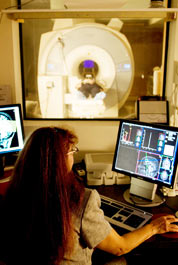

Scientific Lectures //
Differentiating Emotional Processing and Attention to Emotion in Psychopathy
Nathaniel E. Anderson, Ph.D.- Postdoctoral Fellow at the Mind Research Network
Presented: September 22, 2015
ABSTRACT: Psychopathy is widely characterized by certain deficits in emotional processing; however, recent evidence suggests that these emotional deficits may stem from more fundamental cognitive abnormalities that impact processes of attention. An attention-based model of psychopathy has accumulated promising evidence, yet very little work has specifically examined the functional neural circuits that may help characterize these abnormalities with respect to attention. I will discuss fMRI data from a picture-viewing task designed to differentiate between emotional processing and attention to emotional content. Psychopathy-related differences are apparent in contrasts designed to exhibit emotional processing and attention to emotion. Emotional/Interpersonal features of psychopathy are associated with reduced emotion-dependent facilitation of activity in the visual processing stream. These differences are no longer apparent when attention is focused on emotional content; however, this compensation is accompanied by greater activity in medial prefrontal regions and the temporoparietal junction. Impulsive/Antisocial features of psychopathy, considered apart from emotional deficits, are uniquely associated with hyperactivity in the amygdala both in response to emotional content, and when being vigilant for emotional content. These data suggest that psychopathy-related differences in emotional processing vary with respect to focus of attention. Neural characterizations of these differences are apparent in early visual processing areas, attention networks, limbic, and paralimbic regions of the brain.
Information shared in this lecture was requested be held from public access. MRN employees can access the presentation here.

